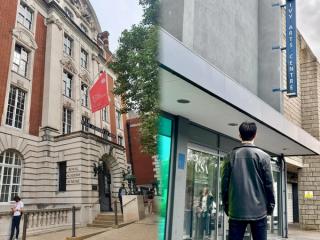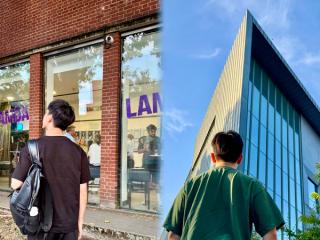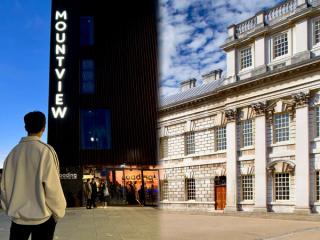The First Leaf of Autumn: Reading UK Master’s Through Performance
London, as one of the global centres for musical theatre, boasts a rich theatrical heritage and a wealth of top creative talents. From classics like Moulin Rouge! and The Phantom of the Opera to recent all-Asian casts in productions such as My Neighbour Totoro and Your Lie in April, audiences witness the dynamic evolution of performing arts under the influence of multicultural vibrancy. In recent years, the visibility of Asian performers has steadily increased, appearing in shows from Hadestown to Les Misérables. This reflects the growing acceptance of “colour-blind casting” — where talent and performance take precedence over background — offering a beacon of hope for many young performers overseas.
For aspiring artists aiming to pursue their dreams in the UK, one-year master’s programmes in musical theatre offer an accelerated path to acquiring professional skills and adapting to the local culture. Through agent showcases and final productions, students gain exposure to the industry. Additionally, post-Brexit demand for international talent and more accommodating visa policies have become important drivers.
This year, we visited six master’s courses in London and its surroundings, observing their 2025 graduation productions to understand each school’s training focus, resource allocation, and student calibre. We hope this report serves as a guiding light for applicants in making informed choices.

Royal Academy of Music (RAM): Assassins ★5.0
Situated in central London near Regent’s Park, RAM benefits from a prime location. As one of the founding institutions behind ABRSM exams, it commands strong musical credentials, and enjoys a distinguished reputation in musical theatre with alumni frequently active in the West End and international tours. Their recent graduation productions often showcase works by Stephen Sondheim, demonstrating a balanced emphasis on musicality and drama.
This year’s Assassins incorporated circus and clowning elements to heighten the show’s dark and absurd themes, delivering a fresh take. Students exhibited solid vocal training alongside commendable dramatic skills — from dialogue and monologues to character interpretation, all impressively mature. The climax combined LED projections and stage effects for a striking impact, surpassing typical student production quality.
While RAM has traditionally prioritised vocal training with a relatively conservative approach to movement and dance, recent efforts have been made to strengthen this area. The school tends to select performers with strong individual styles and stage presence; for students less experienced in dance, continued physical training could offer greater agency in future performances. After all, while being a triple threat is ideal, convincingly embodying a role remains the performer’s ultimate challenge.
Guildford School of Acting (GSA): Children of Eden ★5.0
Located in Surrey about an hour from London, GSA is a long-established drama institution renowned for its training in acting and musical theatre. The campus offers a peaceful environment; although its theatre facilities are modest, the lighting and stage design show experimental and artistic flair, lending a distinctive black-box theatre charm.
This production employed a ensemble structure with the entire class collaboratively telling the story, ensuring everyone had lines and solo moments. The cast displayed consistent ability across singing, acting and dancing, reflecting integrated training outcomes. GSA’s commitment to balanced development in all three disciplines was fully realised here, with physicality, voice and rhythm weaving together seamlessly to tell the story, making for a smooth viewing experience.
Notably, the director encouraged students to express their own cultural backgrounds by naturally incorporating native language lines, exemplifying the school’s support for multiculturalism. The overall performance was rich in emotion and dramatic tension, reaffirming GSA’s strength in cultivating well-rounded performers.

London Academy of Music & Dramatic Art (LAMDA): The 25th Annual Putnam County Spelling Bee ★4.0
Famed for its drama training and examination system, LAMDA launched its musical theatre master’s course this year to much industry interest. Situated in West London, the surroundings are quieter but the school is near many London landmarks, maintaining a strong learning atmosphere. As one of the UK’s oldest drama schools, LAMDA boasts robust faculty and resources, offering students an in-depth educational experience.
The production featured four rotating casts, giving every student a chance to play lead roles. The intimate venue created a close connection between audience and performers, enhancing interaction and testing actors’ improvisation and spontaneity. The show flowed smoothly and entertained well, with consistent performances across acting, vocals and movement, demonstrating solid training results.
Particularly commendable was LAMDA’s dedicated showcase for Asian students, celebrating their cultural heritage and artistic uniqueness. The event incorporated multiple languages and performance styles, underscoring the school’s commitment to diversity and inclusion, and providing international students with broader creative opportunities.
Royal Central School of Speech and Drama (RCSSD): Carrie ★4.0
Recently transitioning from a “Music Theatre” to a performance-centred “Musical Theatre”, RCSSD presented Carrie as its first graduation production under the new structure. Though the show had a challenging Broadway history, it remains vocally demanding and dramatically intense, signalling the school’s and students’ willingness to take on challenges.
Vocally, students impressed with mastery of high notes, mixed voice and belt techniques, reflecting thorough training. Although the choreography and movement were somewhat raw, they provided valuable learning and breakthrough opportunities. Due to budget and space limitations, some magical stage effects were simplified, but the students’ dramatic performances compensated, successfully building tension and emotional depth.
Strong language and diction skills have long been RCSSD’s hallmark; students delivered clear vocal projection and detailed articulation, particularly adept with American English. As an initial production post-restructure, Carrie displayed the new course’s potential and direction, making the future promising.

Mountview Academy of Theatre Arts: Curtains ★3.5
Mountview is known for its practical training approach and houses some of London’s best-equipped musical theatre facilities. Located in the culturally diverse southeast London, it lacks the glamour of central areas but is brimming with artistic freedom and creative energy.
This year’s choice was the American whodunit comedy Curtains, set in 1959 Boston. The cast paid close attention to characterisation and timing, especially the American accents. However, some performances leaned too heavily into comedic exaggeration, occasionally disrupting pacing. Vocals and ensemble dance were solid though not outstanding, demonstrating reliable fundamentals.
The master’s programme largely benefits from strong undergraduate courses and industry partnerships, having delivered polished productions like Big Fish previously. While this year’s show was not the peak, the overall student standard showed promise, suggesting graduates can still find their place professionally.
Trinity Laban Conservatoire of Music and Dance: Bad Girls ★3.0
Known primarily for music and dance education with an international grading system popular in Asia, Trinity Laban staged its first musical theatre master’s graduation production this year, which remains in an exploratory and developmental phase.
The production revealed the course still forming its core training framework. With a high proportion of non-native English speakers, coordinating language and rehearsal progress proved challenging, affecting some dramatic pacing but also prompting reflection on integrating language and theatrical training more effectively.
It is worth noting that several students in the ensemble were not given any lines or solo moments in this production. While the director likely balanced roles based on the script and production needs, enhancing inclusivity and transparency would benefit student development. The limited number of male performers also restricted diversity in casting and role distribution.
Nonetheless, students showed noticeable short-term progress in singing and dance, particularly considering many did not come from performing backgrounds. Building stage confidence within one year is commendable. As the course matures, it holds potential as a launching pad for beginners and new talent.
Other UK Musical Theatre Master’s Programmes
- Royal Welsh College of Music & Drama: A leading UK arts institution with their agent showcase takes place in London, ensuring strong industry connections. Located in Cardiff, it offers a focused learning environment but is less convenient for networking and attending shows, making it more suitable for those planning to return home or pursue education careers.
- Leeds Conservatoire: Known for its music specialisms and modern facilities, its musical theatre course emphasises original productions and interdisciplinary creativity. Though less connected to commercial industry, it is a promising choice for students prioritising creative development.
- Goldsmiths, University of London: Currently offers musical theatre master’s with focuses on production and composition, with plans to add performance pathways. Situated in London with vibrant communities, it appeals to those seeking experimental and innovation-driven programmes.
Each graduation production encapsulates a school’s teaching philosophy and student energy, reflecting training priorities, resource allocation, and academic culture. This insight helps prospective applicants choose with greater clarity.
UK musical theatre education is rigorous and competitive, with no “diploma mills” or “easy master’s” courses. Getting offers to any institution is recognition of a student’s potential and ability. Every school has unique strengths and growth areas; ultimately, success depends on how students utilise resources and plan their learning journey.
If you dream of standing on the musical theatre stage, start by researching thoroughly, speaking with alumni, and when needed, consulting professional tutors one-on-one to maximise your preparation. If you wish to pursue your musical theatre ambitions in the UK, feel free to discuss with our mentors — the next star lighting up the West End could be you!


